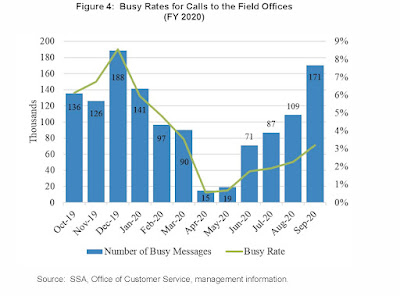The House Social Security Subcommittee asked Social Security's Office of Inspector General to do a study on Social Security's telephone service during the pandemic. The Inspector General's office prepared The Social Security Administration’s Telephone Service Performance in response to this request. None of the data presented by OIG is less than a year old and most of it is from before the pandemic even began. Was it too much trouble to obtain more recent data? By the way, the Inspector General's cover letter includes a sentence that may encapsulate the current Inspector General's attitude: “My office is committed to combating fraud, waste, and abuse in SSA’s operations." Right, but what about how well the agency serves the public? Isn't that part of your mission, too. You were asked to produce a report on that. Why are you emphasizing "waste, fraud and abuse" in your cover letter?
Anyway, here are some interesting charts from the report -- click on each of them to view full size:















